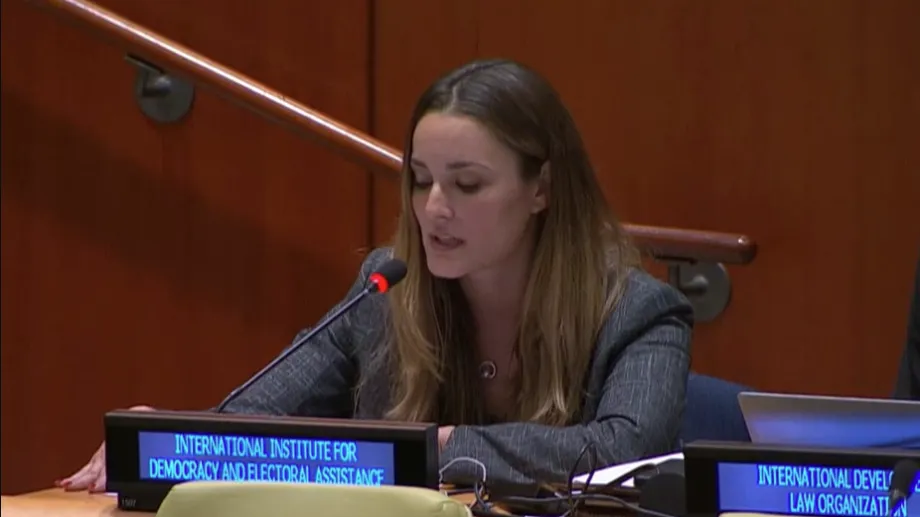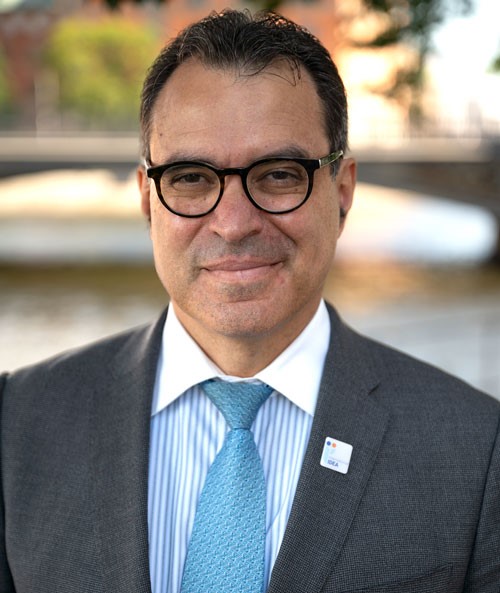International IDEA's statement at the briefing by UN Secretary-General on the "New Agenda for Peace"

Briefing by the UN Secretary-General on the policy brief "New Agenda for Peace"
20 July 2023, UN Headquarters New York
Statement by Kevin Casas-Zamora, Secretary-General
International Institute for Democracy and Electoral Assistance (IDEA)
Mr. Secretary-General, Excellencies,
International IDEA would like to thank the UN Secretary-General, Mr. António Guterres, for putting forth this new policy brief on the importance of a New Agenda for Peace to tackle new challenges and crises that have emerged in the 21st century. Peace, a pillar of UN work, cannot be taken for granted. Like democracy, it has to be nurtured, promoted and protected.
We would like to emphasize, as highlighted in the policy brief, the importance of addressing interlocking threats. These threats include the perils of weaponizing new and emerging technologies, particularly artificial intelligence, as addressed this week in the Security Council and in the discussions on the Global Digital Compact. They also include, prominently, the climate crisis that impacts all nations in the world and, in particular, the small island developing states.
All these converging dangers are compounded by threats of a more political nature that directly conspire against global peace. The erosion of democratic values, particularly the shrinking of the civic space and the clamping down on the freedom of the press, are direct threats to the peaceful coexistence that this organization is committed to defending. According to International IDEA’s Global State of Democracy Report of 2022, Russia’s war of aggression in Ukraine has highlighted that democracy is central to the defence of peace (GSoD, 2022). Russia’s illegitimate war against Ukraine is the direct result of a political system where power is opaque, unaccountable, and utterly devoid of the self-correcting possibilities that only democracy secures. A democratic Russia would have not invaded Ukraine. It is not random that the headwinds that democracy has faced globally over the past decade have coincided with a resurgence of armed conflicts, as seen in Ukraine but also in the civil wars in Syria, Ethiopia, Sudan, Myanmar, among others.
Moreover, International IDEA’s analysis on the global performance of democracy, including through our newly developed and constantly updated Democracy Tracker, shows that, particularly in transitional and post-war contexts, the emergence of a constitutional culture, of genuine adherence to fundamental rights, and of inclusive governance practices can help immensely to overcome challenges to peace, to help societies leave behind a violent past, and enable the emergence of workable social contracts where all groups have a stake.
The pursuit of inclusive governance practices deserves particular emphasis. Ever greater inclusiveness is essential for the viability of democracy, sustainable development, and peace. And this is not an empty declarative phrase, but one laden with concrete consequences: youth, women, and civil society actors must have a meaningful place in the key decision-making processes in society. Without a constant drive for ever greater political inclusion of these key groups, societies will inevitably fail at sustainable development. Concrete commitments to implement inclusive governance practices should be integral to the discussion and the negotiation process of the new Agenda for Peace.
The global weakening of democratic values matters for peace. It is for that reason that International IDEA particularly welcomes the UNSG’s recognition that the rule of law is the foundation for fair, just, and peaceful societies, as it is also recognized in the 2030 Agenda for Sustainable Development under Goal 16. Without the rule of law and without inclusive decision-making –principles that only democracy protects in a robust way—there is no sustainable development, and without sustainable development there is no peace. A key corollary flows from this, one that should be stated over and over: the achievement of SDG 16 is indispensable for the attainment of all the other sustainable development goals and also for the success of the New Agenda for Peace.
International IDEA renews its commitment to working, in partnership with the UN system and its Member States, regional organizations and other stakeholders, to foster an agenda for peace in our time through the advancement of key democratic values, such as the rule of law, and ever greater inclusion of youth, women and civil society in decision making. Democracy is still the best guarantor of peace within and between countries. But even more concretely, making sure that SDG 16 is fully achieved, is one of the best contributions we can all make to sustainable development and peace. Let us keep our minds focused on this simple and powerful truth.
Thank you.
